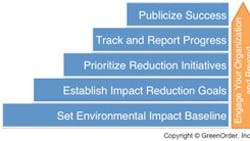How to Get the Most Out of Wal-Mart's 15 Questions for Suppliers
With the announcement of Wal-Mart's Sustainable Index and the release of 15 questions for its suppliers, the retail giant has ignited a far-reaching dialogue on supply chain transparency and environmental sustainability, and demonstrated that it has the ambition and clout to not only change the way suppliers operate their business, but also how they see their business.
Wal-Mart's plan is to roll out a universally adopted rating system for the retail industry, the Sustainable Index, which assesses suppliers based on environmental and social criteria. Wa-Mart is starting with these questions for its suppliers, crafted in collaboration with thought leaders in academia. The questions, which vary in complexity, are grouped into four broad areas of environmental analysis: Energy and Climate, Material Efficiency, Natural Resources and People and Community.
If you are a Wal-Mart supplier just beginning to think about environmental impact, or even if you are already recognized as a leader in the space, you can use this as an opportunity to create or enhance your sustainability strategy, and create value for your company. Perhaps most importantly, the 15 questions offer an opportunity to partner with a key retailer, gain insight into its processes and enhance your market position. Depending on where you are on your trajectory, the following guidelines will help you frame your thinking around the Index.
If you have just begun to think about sustainability as a business strategy, Wal-Mart's 15 questions can be boiled down to three simple ones:
- Do you measure and set goals for your environmental impacts?
- If so, what impacts are you measuring, what are your goals, and are they consistent with recognized standards?
- Do you know if your suppliers are doing the same?
Answering Wal-Mart's questions may require resources and processes your organization has yet to set in place. If you're helping to begin to integrate sustainability into your organization, this is an ideal opportunity to shape your processes to meet the challenge.
Here's a simple, proven approach for getting started:
If you have already begun this process and are anticipating next steps you should begin to anticipate Wal-Mart's next steps. Wal-Mart intends to make this index "open-source" and owned by a consortium of stakeholders with mixed interests, and we predict the Sustainability Index will rely heavily on existing, publicly-available reporting and certification standards.
Understanding these standards could also help you anticipate growing demands from your other buyers on their supply chain policies. For instance, Unilever committed to source only RSPO-certified palm oil by 2015. Mars and Cadbury are making similar commitments on cocoa sourcing.
The better you understand third-party systems and anticipate changes to your own operations and sourcing practices to meet and exceed them, the more likely you can be positioned as a preferred supplier, to Wal-Mart or otherwise. Based on our experience helping companies position environmentally preferable products, we have listed some of the more widely adopted standards relevant to suppliers:
Selected Environmental Standards and Number of Certifications
If you have already received recognition as a sustainability leader, filling out Wal-Mart's questionnaire should be a piece of cake for you, but shaping how you can benefit from this opportunity to lead takes additional effort. In addition to data collected from the questionnaire, Wal-Mart and the Sustainability Consortium (led by universities, collaborating with suppliers, NGOs and others) will need input from leading suppliers to develop a comprehensive, well thought-out and feasible scoring system. This means there is an opening for you to showcase your thought leadership by partnering with Wal-Mart to shape the Sustainability Index.
There is no shortage of brilliant ideas Wal-mart can incorporate into its Index. Nike, for instance, used its branded "Considered Design" product standard to tie together its celebrated footwear designs with its commitment to responsible sourcing and supply chain environmental impact reduction. Nikes self-imposed environmental standards not only prepare the company to meet and/or exceed regulations (government-established or not) and provide a sample standard for retailers to consider -- they help Nike communicate how the company can grow the top line by doing good.
You can certainly leverage some of your best practices and insights to make your mark on the Index. One of the perks of getting your ideas in is that once implemented, your organization will have first-mover advantage, as you have been doing it all along.
Ultimately, whether you are just starting to think about sustainability or are already recognized as a green leader, if you approach these 15 questions as a fill-in-the-blanks form, you will gain minimal business value. However, if you approach Wal-Mart's questions as point of departure from which to shape or enhance your sustainability strategy, you will strengthen an important relationship and realize some real business value down the line.
Duncan Cheung is an Analyst at GreenOrder, an LRN company. GreenOrder is a strategy consulting firm that helps leading enterprises maximize the value of sustainability. Analyst David Gottesman also contributed to this article. http://www.greenorder.com/
Interested in information related to this topic? Subscribe to our weekly Value-chain eNewsletter.
